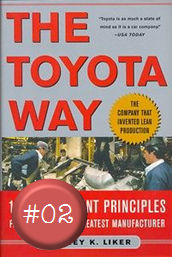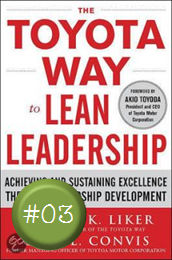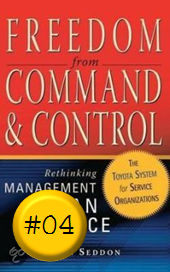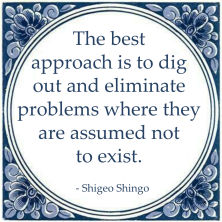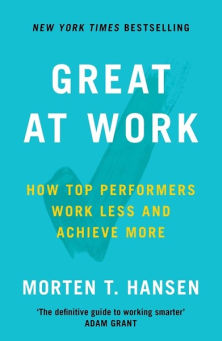Leren als cyclisch proces volgens Jan Willem van de Boogert
Gepubliceerd in
Bluff Your Way Into
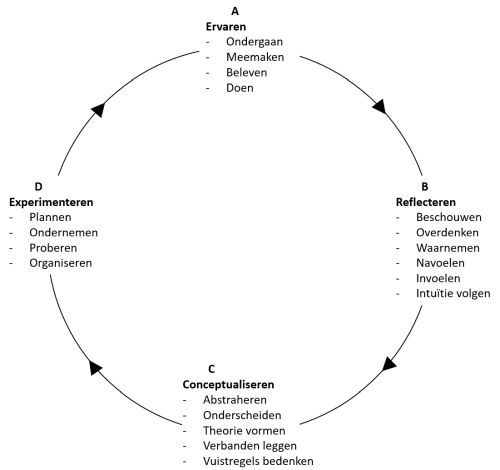
In zijn boek Praktijkgericht opleiden - al doende leren in de beroepspraktijk beschrijft Jan Willem van den Boogert leren als cyclisch proces:

Leren als een cyclisch proces
Als iemand in de praktijk leert, gebeurt dit in een cyclisch proces. Dit complexe proces is te onderscheiden in vier fasen. Deze fasen zijn:
- Ervaren
- Stilstaan bij de ervaring (reflecteren)
- Begrijpen en conclusies trekken (abstraheren/conceptualiseren)
- Experimenteren
In allerlei leerprocessen, in werk, maar ook in hobby's, sport of in in het dagelijks leven speelt dezelfde cyclus.
De Amerikaan David Kolb (1984) ontdekte en beschreef deze cyclus en noemde hem: 'de cyclus van ervaringsleren'. Deze 'leercyclus van Kolb' helpt ons zichtbaar maken op welke manier we leren van of via ervaringen. Door te begrijpen in welk cyclisch patroon het leren gebeurt, bent u beter in staat om leerprocessen bewust te herkennen, te faciliteren en te begeleiden.
Als alle fasen in de cyclus doorlopen zijn, is er sprake van leren. Een ervaring wordt een leerervaring door te reflecteren op de ervaring en door inzicht te verwerven uit de ervaring en vervolgens met dit inzicht te handelen. Het klinkt misschien theoretisch, maar het is een heel praktisch - alledaags - iets.
(...)
De cyclus heeft geen vast begin- of eindpunt. Hij kan op verschillende punten beginnen. Als het startpunt van het leren een ervaring is, dan beginnen we bij de ervaring (fase 1). Het startpunt kan ook anders zijn, bijvoorbeeld een inzicht of theorie, of bekijken hoe iemand anders iets doet. In die gevallen begint de cyclus op een ander punt.
Bron: Praktijkgericht opleiden - al doende leren in de beroepspraktijk, Jan Willem van den Boogert
Laatst aangepast op zondag, 19 april 2020 11:54
Systeemdenken met John Gall
Gepubliceerd in
Citaten: systeemdenken

Just calling it 'feedback'doesn't mean that it has actually fed back to speak precisely: it hasn't fed back until the system changes course. Up to that point, it’s merely sensory input.
John Gall
Laatst aangepast op maandag, 04 mei 2020 07:57
Lean-transformatie-risico's volgens Karen Martin
Gepubliceerd in
Lean Six Sigma
Karen Martin beschrijft in haar boek The Outstanding Organization de link tussen het Dunning-Kruger effect en het risico op het toepassen van iets-in-name-only (bijv. Lean, Prince2 of Agile), waarbij je alleen de 'vormen' toepast en niet de 'functies':

Missing the Trees for the Forest
In many of the organizations with which I've worked, I've noticed that managers and workers simply don't see the chaos or the causes of chaos around them. The types of behaviors that result in chaos usually are not purposeful, but in many cases they have become habitual—which makes them all the more damaging to an organization striving to be outstanding. Habits are nearly invisible. You engage in them without realizing they are there. And you can look at another organization that is succeeding and not notice the real differences between how that outstanding organization behaves and how your organization behaves. When looking at outstanding organizations, you may miss the important trees and just see the forest.
This type of blind spot is similar to what is known as the Dunning-Kruger effect, after the two psychologists who described it. Basically, the Dunning-Kruger effect notes that people who are truly incompetent don't know that they are incompetent.'
They lack the knowledge that allows them to understand the difference between competence and incompetence. If you apply this concept to the world of organizational performance, you begin to understand why organizations often adopt improvement tools and isolated components of holistic improvement philosophies but consistently fail to see the things that truly make a difference in performance.
My colleague Tim Ogden introduced me to the work of economist Lant Pritchett, who describes this process as isomorphic mimicry, a phrase that means the copying of forms rather than functions. It's similar to, for instance, non-venomous snakes that have evolved to look like their poisonous cousins. These pretenders will fool you if you don't look too closely, but they can't execute when it really matters. Pritchett uses it to explain why so many years of work by high-powered consultants and billions of dollars of aid to developing countries hasn't produced well-functioning government institutions. These efforts often have been focused on getting the governments to mimic the government institutions in developed countries as they exist today. But these institutions usually developed and changed over a long period of time and work only because of the behaviors, capabilities, culture, and habits that developed. Copying these institutions in their current form, without the history, culture, knowledge, experience, and habits that underlie them, produces tepid results at best. The institutions just don't function, even though they look identical to the functioning institutions in developed countries on paper.
Bron: The Outstanding Organization, Generate Business Results by Eliminating Chaos and Building the Foundation for Everyday Excellence - Karen Martin
Laatst aangepast op zaterdag, 30 mei 2020 09:34
Veranderen met Eliyahu M. Goldratt
Gepubliceerd in
Citaten: verandermanagement

The hardest thing for competitors to emulate is a fundamental change.
Eliyahu M. Goldratt
Laatst aangepast op maandag, 04 mei 2020 07:57
Telling ain't training (boekentip)
Gepubliceerd in
Boeken over Lean Six Sigma
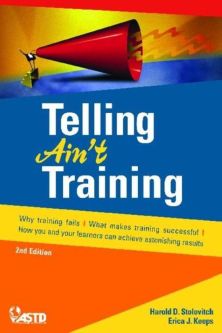
Telling Ain't Training
Harold D. Stolovitch, Erica J. Keeps
Bij Bol.com | Managementboek
Laatst aangepast op vrijdag, 29 mei 2020 19:34
Continu verbeteren volgens Akio Toyoda
Gepubliceerd in
Lean-tegeltje
Laatst aangepast op vrijdag, 29 mei 2020 19:25
Probleemoplossing volgens Russell Ackoff
Gepubliceerd in
Citaten: systeemdenken

Successful problem solving requires finding the right solution to the right problem. We fail more often because we solve the wrong problem than because we get the wrong solution to the right problem.
Russell Ackoff
Laatst aangepast op maandag, 04 mei 2020 07:56
Leren en onderwijzen volgens Clive Shepherd, Phil Green & Barry Sampson
Gepubliceerd in
Bluff Your Way Into

Clive Shepherd, Phil Green en Barry Sampson beschrijven in hun boek Live online learning: a facilitator's guide vijf verschillende 'types van leren' die elk een eigen strategie vragen om deze te onderwijzen:
- Proces
- Procedurele taak
- Principe-gebaseerde taak
- Feiten
- Concepten

Proces
Serie van fase die elkaar opvolgen op oorzaak/gevolg-basis
Strategie: help mensen om het proces te begrijpen door het gebruiken van diagrammen, experiementen, case studies en simulaties.
Procedurele taak
Stap-voor-stap activiteiten die elke keer op grotendeels dezelfde manier worden afgehandeld.
Strategie: demonstreren en vervolgens toepassen in de praktijk en feedback geven.
Principe-gebaseerde taak
Taakuitvoering wordt geleid door richtlijnen die elke keer anders worden geïmplementeerd.
Strategie: demonstreren door te laten zien hoe de taak wordt uitgevoerd in verschillende situaties, vervolgens taken daadwerkelijk uitvoeren in verschillende situaties.
Feiten
Arbitraire stukken informatie die onthouden moeten worden of die je kunt raadplegen op het moment dat je dit nodig hebt.
Strategie: herhaald oefenen, met ezelsbruggetjes.
Concepten
Woorden of zinnen die een hele klasse of categorie items representeert die bepaalde kenmerken gemeenschappelijk hebben.
Strategie: uitleggen welke unieke kenmerken het concept heeft, voorbeelden geven en mensen goede en slechte voorbeelden van een concept laten identificeren.
Bron: Live online learning: a facilitator's guide, Clive Shepherd, Phil Green, Barry Sampson
Laatst aangepast op woensdag, 27 mei 2020 19:39
Standvastig volgens Clayton M. Christensen
Gepubliceerd in
Citaten: motivatie

Decide what you stand for. And then stand for it all the time.
Clayton M. Christensen
Laatst aangepast op maandag, 04 mei 2020 07:55
Leren volgens Clark Quinn
Gepubliceerd in
Bluff Your Way Into

In zijn blogpost Making Small Learnings Work beschrijft Clark Quinn waarom 'micro learning' en 'spaced learning' een goede combinatie zijn. Het onderstaande fragment beschrijft de kracht van herhaling om patronen te vormen met neuronen:

Making Learning Work
Learning happens over time. It turns out that learning is really about strengthening the connections between neurons. It happens by triggering them in conjunction with one another. As the saying goes: “the neurons that fire together, wire together.” While it happens at the neuronal level, the firing for formal learning happens by activating patterns triggered by semantic elements. That is, words or images, not triggering individual neurons.
In fact, we build bigger patterns, or chunks, by activating things together enough that they become connected below consciousness. What we’ve chunked is what we’ve learned, as well as the ability to apply those chunks to make decisions. Practice automates the ability to recall things.
Now it turns out that the mechanism that does the strengthening of the connections gets tired. It can only do so much strengthening before you pretty much literally need sleep before you can strengthen some more. In short, you’ve got to practice a bit one day, and then come back to it another. Again and again.
That’s called "spaced learning," and it’s a robust phenomenon. You can get people to perform to a certain level at the end of a day, but much will be gone the next one. Think about anything you can do with any reasonable degree of excellence; it’s a safe bet that you’ve done it much over time.
Bron: Making Small Learnings Work
Laatst aangepast op woensdag, 02 juni 2021 18:43
|

![]()












